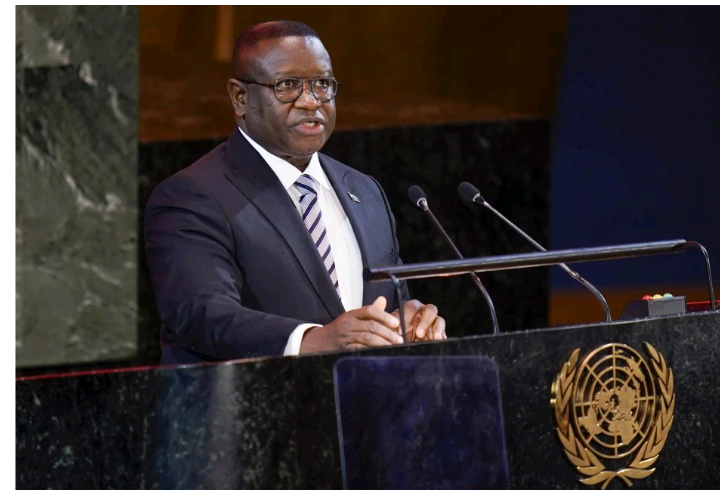
President Bio Advocates for more African seats at UNSC
After decades of seeking a bigger voice in the United Nations ‘ most powerful body, Africa “cannot wait any longer,” Sierra Leone’s president told the Security Council on Monday.
Chairing a meeting that his country convened, President Julius Maada Bio pressed a longstanding bid for African countries to get more council seats, including two permanent and potentially veto-wielding spots.
“The time for half-measures and incremental progress is over. Africa must be heard, and its demands for justice and equity must be met,” Bio said, calling his continent the unquestionable victim” of an imbalanced, outdated, and unrepresentative Security Council
structure.
It wasn’t the first time the council has heard calls for expanding and reshaping its membership —
and African countries aren’t the only ones that want more representation. While there’s a general
sense that the council needs to change, discussions have bogged down over differences on how
much to expand the group, what countries to include, and what powers it should have.
But Bio’s presence put an exclamation point on the issue ahead of a U.N.
“Summit of the
Future” and the annual General Assembly gathering of presidents, prime ministers, and
monarchs. Both gatherings are scheduled for next month.
Some countries are hoping for momentum from the summit, which is meant to generate a wide-ranging new vision of what international cooperation should look like in this century. The latest draft of the summit’s potential “Pact for the Future” terms Security Council reform a priority and pledges an “ambitious” result, with specific language still to come.
“We are sure it is a matter of time. Because the gatekeepers will find it difficult to let us in,” Bio
said at a news briefing Monday, but “we have a genuine and compelling case.”
Set up in 1945 to try to maintain peace in the wake of World War II, the Security Council can
levy sanctions, deploy peacekeeping missions, and otherwise pass legally binding resolutions, if sometimes ignored.
Its composition reflects the postwar power structure and a time when most of Africa was under European control.
The United States, Russia, China, Britain, and France are permanent, veto-wielding members.
Ten other seats- originally six, until a 1965 expansion — go to countries that get two-year council terms, without veto power. The broader General Assembly elects them by region, with three seats for Africa.
African countries, and many others, have argued that the arrangement shorts the continent with the world’s fastest-growing population, now at 1.3 billion. The continent’s 54 countries make up 28% of the U.N.‘s member states. Five of the U.N.’s 11 current peacekeeping operations are in Africa, as are four of the top 10 countries in terms of sending troops.
The African Union, a regional group, has called for two additional elected seats — yielding a
total of five — and two permanent ones for countries on the continent.
The permanent seats, in particular, must “be urgently addressed,” Namibia’s foreign minister, Peya Mushelenga, told the council Monday.
Any changes to the council’s composition would be up to the General Assembly, which has held negotiations for years. Assembly President Dennis Francis said Monday that Africa is “manifestly underrepresented” on the council and that the status quo is “simply wrong.”
But the U.N.’s member countries have floated many different ideas for changing the council, and any move to accommodate Africa would likely stir pressure to consider other proposals. The United States, for instance, backs adding permanent seats for countries in Africa, Latin America
and the Caribbean, among others.
“Let’s stop admiring the problem here. We need to move to solutions,” U.S. Ambassador Linda
Thomas-Greenfield, whose prior postings include multiple African countries, told the council.
Bio, whose nation currently holds the council’s rotating presidency, urged the group to get
behind giving his continent priority in any structural changes.
“Africa cannot wait any longer,” he said